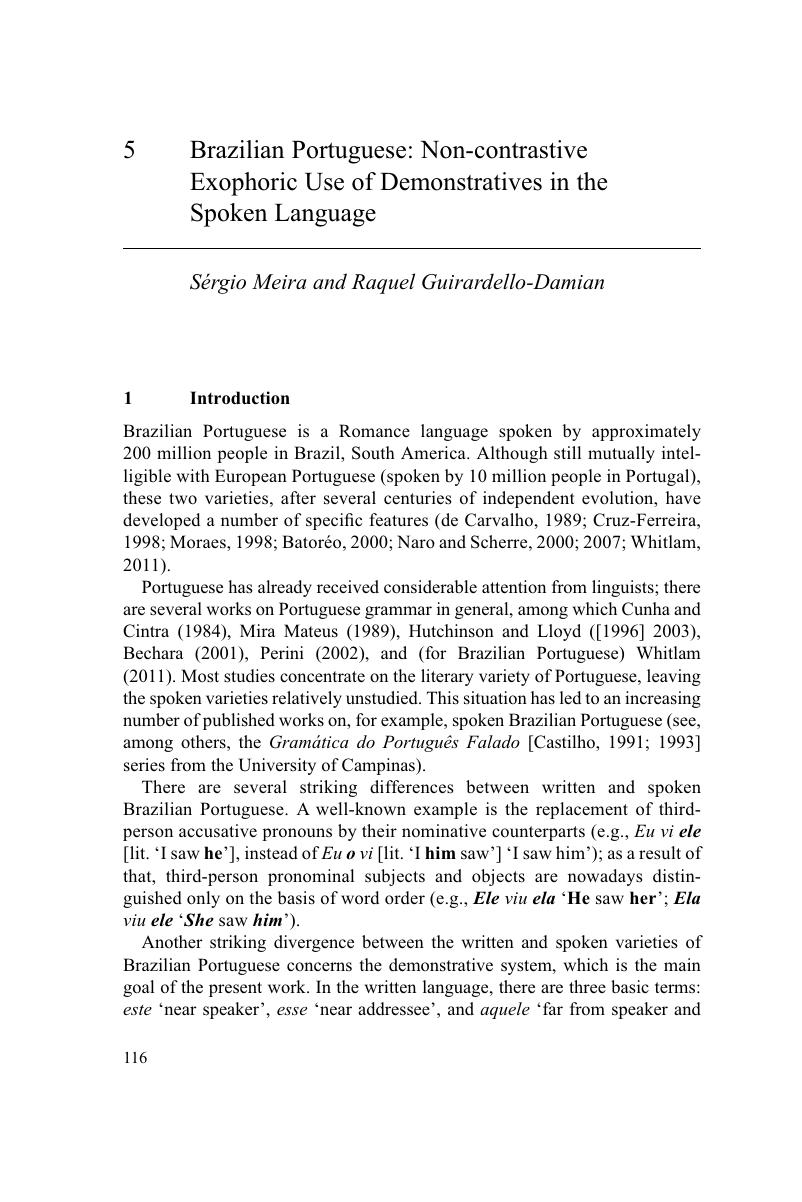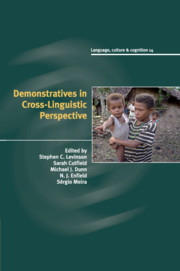Book contents
- Demonstratives in Cross-Linguistic Perspective
- Language, culture and cognition
- Demonstratives in Cross-Linguistic Perspective
- Copyright page
- Contents
- Figures
- Tables
- Contributors
- Preface
- 1 Introduction: Demonstratives: Patterns in Diversity
- 2 The Demonstrative Questionnaire: “THIS” and “THAT” in Comparative Perspective
- 3 Lao Demonstrative Determiners Nii4 and Nan4: An Intensionally Discrete Distinction for Extensionally Analogue Space
- 4 Dalabon Exophoric Uses of Demonstratives
- 5 Brazilian Portuguese: Non-contrastive Exophoric Use of Demonstratives in the Spoken Language
- 6 “See This Sitting One”: Demonstratives and Deictic Classifiers in Goemai
- 7 Tzeltal: The Demonstrative System
- 8 Yucatec Demonstratives in Interaction: Spontaneous versus Elicited Data
- 9 Lavukaleve: Exophoric Usage of Demonstratives
- 10 Tiriyó: Non-contrastive Exophoric Uses of Demonstratives
- 11 Trumai: Non-contrastive Exophoric Uses of Demonstratives
- 12 Saliba-Logea: Exophoric Demonstratives
- 13 Warao Demonstratives
- 14 Chukchi: Non-contrastive Spatial Demonstrative Usage
- 15 Yélî Dnye: Demonstratives in the Language of Rossel Island, Papua New Guinea
- 16 Tidore: Non-contrastive Demonstratives
- 17 The Jahai Multi-term Demonstrative System: What’s Spatial about It?
- Index
- References
5 - Brazilian Portuguese: Non-contrastive Exophoric Use of Demonstratives in the Spoken Language
Published online by Cambridge University Press: 12 July 2018
- Demonstratives in Cross-Linguistic Perspective
- Language, culture and cognition
- Demonstratives in Cross-Linguistic Perspective
- Copyright page
- Contents
- Figures
- Tables
- Contributors
- Preface
- 1 Introduction: Demonstratives: Patterns in Diversity
- 2 The Demonstrative Questionnaire: “THIS” and “THAT” in Comparative Perspective
- 3 Lao Demonstrative Determiners Nii4 and Nan4: An Intensionally Discrete Distinction for Extensionally Analogue Space
- 4 Dalabon Exophoric Uses of Demonstratives
- 5 Brazilian Portuguese: Non-contrastive Exophoric Use of Demonstratives in the Spoken Language
- 6 “See This Sitting One”: Demonstratives and Deictic Classifiers in Goemai
- 7 Tzeltal: The Demonstrative System
- 8 Yucatec Demonstratives in Interaction: Spontaneous versus Elicited Data
- 9 Lavukaleve: Exophoric Usage of Demonstratives
- 10 Tiriyó: Non-contrastive Exophoric Uses of Demonstratives
- 11 Trumai: Non-contrastive Exophoric Uses of Demonstratives
- 12 Saliba-Logea: Exophoric Demonstratives
- 13 Warao Demonstratives
- 14 Chukchi: Non-contrastive Spatial Demonstrative Usage
- 15 Yélî Dnye: Demonstratives in the Language of Rossel Island, Papua New Guinea
- 16 Tidore: Non-contrastive Demonstratives
- 17 The Jahai Multi-term Demonstrative System: What’s Spatial about It?
- Index
- References
Summary

- Type
- Chapter
- Information
- Demonstratives in Cross-Linguistic Perspective , pp. 116 - 133Publisher: Cambridge University PressPrint publication year: 2018
References
- 3
- Cited by



